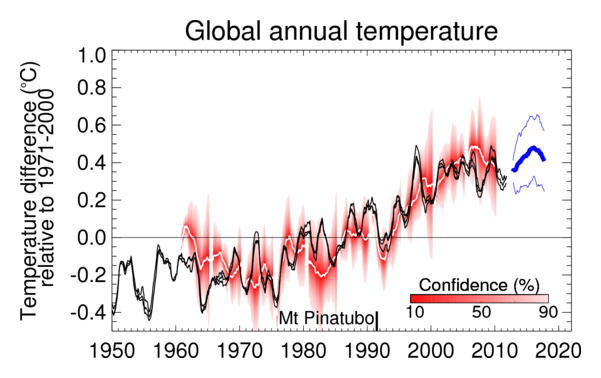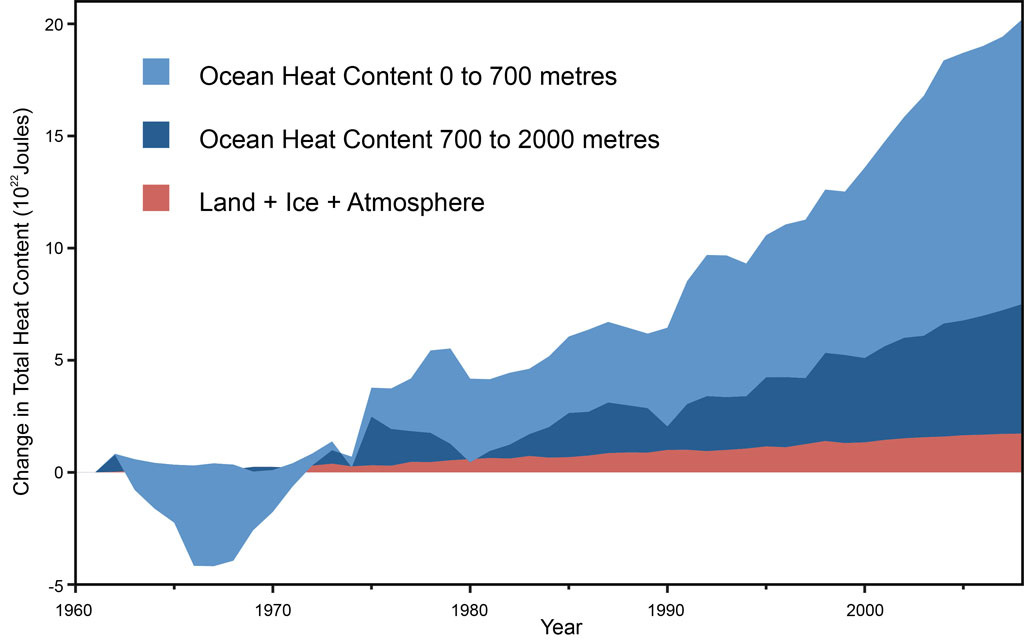
Recently, the British Met Office issued a prediction for global surface temperature changes over the next five years (Figure 1).
Figure 1: Observed (black, from Hadley Centre, GISS and NCDC) and predicted global average annual surface temperature difference relative to 1971-2000. Previous predictions starting from June 1960, 1965, ..., 2005 are shown as white curves, with red shading representing their probable range, such that the observations are expected to lie within the shading 90% of the time. The most recent forecast (thick blue curve with thin blue curves showing range) starts from November 2012. All data are rolling annual mean values. The gap between the black and blue curves arises because the last observed value represents the period November 2011 to October 2012 whereas the first forecast period is November 2012 to October 2013.
This latest prediction anticipates a bit less global surface warming than the prediction from last year, as the Met Office explained:
"The latest decadal prediction suggests that global temperatures over the next five years are likely to be a little lower than predicted from the previous prediction issued in December 2011.
However, both versions are consistent in predicting that we will continue to see near-record levels of global temperatures in the next few years."
"...changes in ocean surface temperatures in some parts of the world over the past year are understood to have made a key contribution to the difference between the 2011 and 2012 forecasts, but other factors will also have played a role."
In other words, the Met Office anticipates that natural factors which have dampened the global surface warming over the past decade (a preponderance of La Niña events and low solar activity, for example), may continue to have an overall dampening effect over the next 5 years.
Unfortunately, the Met Office prediction has resulted in quite a few confused articles in the mainstream media. For example, the Daily Telegraph, Daily Mail, Daily Express, Canada's National Post, the Times, and the Indian Express all incorrectly reported that the Met Office is admitting that global warming has "stalled", or some similar variant. These headlines are in direct contradiction to the Met Office forecast, which specifically stated:
"The forecast of continued global warming is largely driven by increasing levels of greenhouse gases."
The confusion arises from the fact that the thick blue line in Figure 1 (the central Met Office prediction) does not rise very far above the previous highest global surface temperatures in 2010, 2005, and 1998. However, by no means does this indicate that global warming has "stalled".
As noted above, the Met Office prediction and explanation of their prediction specifically state that while natural short-term influences are dampening the warming of global surface temperatures, the underlying human-caused warming trend nevertheless remains.
This is beautifully illustrated by a video created by Skeptical Science's Kevin C, with voiceover provided by Daniel Bailey. The video shows the statistical removal of the short-term warming and cooling influences of volcanic eruptions, solar activity, and El Niño and La Niña events from the global surface temperature record.
The video shows that the global surface temperature record provides no evidence to suggest that human-caused greenhouse warming has slowed.
Additionally, global surface temperatures are not an adequate measure of global warming. In fact, more than 90% of the overall warming of the planet goes into heating the oceans (Figure 2).
Figure 2: Components of global warming for the period 1993 to 2003 calculated from IPCC AR4 5.2.2.3.
Nuccitelli et al. (2012) considered the warming of the oceans (both shallow and deep), land, atmosphere, and ice, and showed that global warming has not slowed in recent years despite the dampened surface warming trend (Figure 3).
 Figure 3: Land, atmosphere, and ice heating (red), 0-700 meter OHC increase (light blue), 700-2,000 meter OHC increase (dark blue). From Nuccitelli et al. (2012).
Figure 3: Land, atmosphere, and ice heating (red), 0-700 meter OHC increase (light blue), 700-2,000 meter OHC increase (dark blue). From Nuccitelli et al. (2012).
Some of the confused media articles also made the mistake of claiming the Met Office prediction indicates a global warming "stall" from 1998 through 2017, because the average 2012—2017 surface temperatures are predicted to exceed the 1998 peak by a small margin. This is a classic exampe of one of the 5 characteristics of scientific denialism: cherrypicking. As Professor Myles Allen, Head of the Climate Dynamics Group at the University Of Oxford, explained to the Science Media Centre,
"Comparing the expected temperature for 2013-2017 with a single exceptionally warm year (1998), as some reports have done, is just daft. 1998 was around 0.2 degrees warmer than the 1996-2000 average, largely thanks to a massive, once-a-century El Niño event. The IPCC predicted a warming of 0.1-0.2 degrees per decade due to human influence back in 2000. That means the one-off impact of that El Niño event was equivalent to about 20 years of the expected background warming trend So, unsurprisingly, 20 years later, expected temperatures have risen so that an average year is now as warm as that exceptionally hot year."
In fact, even allowing this cherrypick, the global surface temperature trend since 1998 is likely one of warming, which will likely continue to be the case in 2017 even if the Met Office prediction is correct. Warming is measured through trends, not by comparing cherrypicked individual data points.
Although many natural influences have acted to dampen global surface warming over the past decade, and potentially for the next 5 years if the Met Office prediction is correct, allowing this coincidence to lull us into a false sense of security would be a mistake. Eventually the preponderance of La Niñas will end, solar activity will rise, and so forth. If we have not reduced human greenhouse gas emissions in the meantime, we will face the harsh reality that the time wasted will force steeper and more painful emissions cuts in the future if we are to avoid dangerous climate change.
Let's get real. Global warming is (still) happening. Humans are causing it. If we don't do something to stop it, the consequences are going to be very bad. So let's stop looking for distractions and excuses to delay action, and get on with solving the problem, before we run out of time.
Posted by dana1981 on Thursday, 10 January, 2013
 |
The Skeptical Science website by Skeptical Science is licensed under a Creative Commons Attribution 3.0 Unported License. |